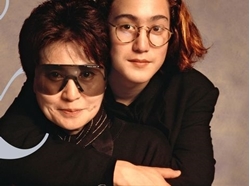- Register
- Log in to Tune-In
- Wishlist (0)
-
Shopping cart
(0)
You have no items in your shopping cart.
Yoko Ono and Sean Lennon Interview

Sean Lennon is talking about his mother’s child-rearing philosophy. “She had a very sort of postmodern, post-hippie, post-feminist way of thinking,” he says of Yoko Ono.“ It was very liberal, and she always treated me like an individual. She never really told me not to do anything, except get a Mohawk or a tattoo. So there were very few boundaries. She believed that kids are individuals and shouldn’t be treated like a subservient class.”
At 84, Ono—singer, artist, activist, and guardian of the legacy of her late husband (and Sean’s father), John Lennon—is enjoying a remarkable late-career reappraisal. The Ono oeuvre, once maligned as a conglomeration of unbearable neo-Dadaist pranks and unlistenable music, is now considered haute. Her conceptual-art projects—films, installations, happenings, and performance pieces, such as her 1964 work Cut Piece, in which she invited viewers to cutoff swaths of her clothing with a pair of scissors—today are seen as groundbreaking. Her albums and recordings, which mostly eschewed melody and traditional song structure, are held up as revolutionary. Even her clipped aphoristic “instructions,” famously compiled in books like her seminal 1964 Grapefruit, have been heralded as presciently tweet-like.
Source: Harper's Bazaar
